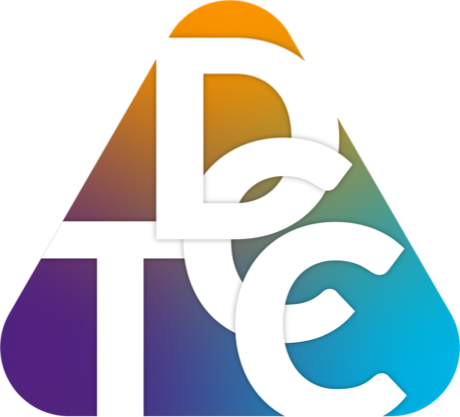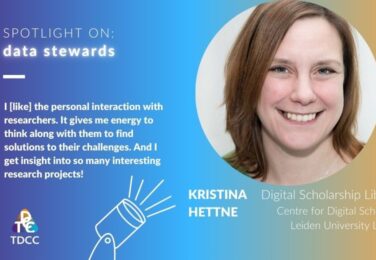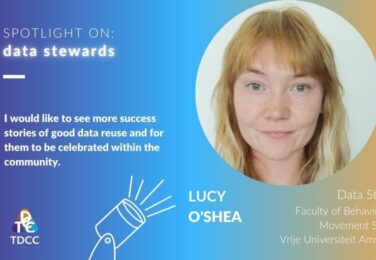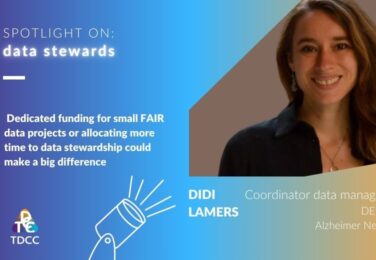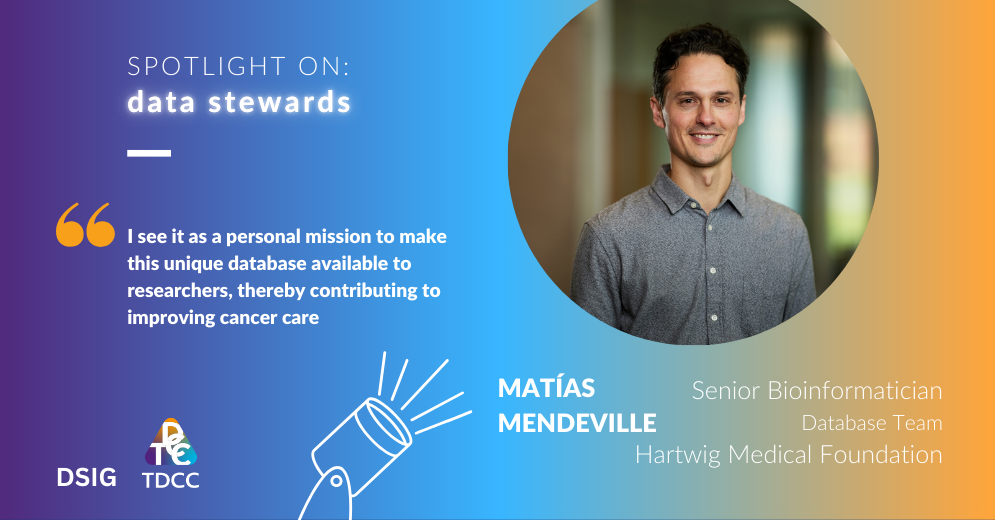
Spotlight on: Matías Mendeville
Every other week, the Thematic DCCs and the Data Steward Interest Group (DSIG) put the spotlight on one research data steward working in the Netherlands, to stimulate knowledge exchange and peer-to-peer learning.
What drew you towards the research data management field?
During my own PhD research I have experienced the vital role of well-annotated, publicly available datasets and databases. Each research builds on previously acquired knowledge. The better this knowledge is documented and accessible to new researchers, the more efficient the follow-up research is.
I have been working for 3 years now at Hartwig Medical Foundation, a foundation that is committed to improving cancer treatment by offering a whole-genome sequencing test for patients with cancer. Provided that the patient has given consent, their data is added to the Hartwig Medical Database. With data from more than 6,000 patients, this is the largest database of metastatic cancer in the world, which is available to all researchers worldwide through a data access request procedure. I see it as a personal mission to make this unique database available to researchers, thereby contributing to improving cancer care.
What is an activity/task of your role that you find yourself looking forward to?
Hartwig shares data with external researchers based on the principle of fit for purpose. As an example, this means that for research into lung cancer only data from lung cancer patients is shared. Additionally, sometimes researchers are only interested in the therapy response of a specific drug. Reading data requests is a great way for me to stay informed of developments in the field of cancer research. Moreover, it is always a great moment to share the data with the researchers - something they are always very grateful for.
What is something unexpected that you can offer help with, if a colleague reaches out to you?
In my role as Data Steward I have a dynamic position in an interdisciplinary team. Based on my domain knowledge of the data (cancer genomics and bioinformatics), I work with many different stakeholders and colleagues from all these different teams.
The work is therefore very varied and requires me to switch gears a lot. In many cases I act as a representative of another domain: For the Legal team, which looks at the database from a data governance perspective, I provide context about the data and biology. For a biologist who works with the data, I provide information about which data may be shared with whom.
What do you think your community of research data professionals is missing?
We live in an era of big data. With young researchers we sometimes notice that it seems evident that patient data is unconditionally available. This is of course not the case, I see an opportunity to enhance awareness of the legal, ethical but also technical implications of data sharing in the wider field.
A side effect of the same developments with regard to big data is that it is sometimes not clear to researchers which data is available and from which sources. The landscape of health data is fragmented; each institute manages its own data. While the power and potential lie in linking different data sources. From a data governance perspective, it is evident that sensitive personal data should be handled with care.
It would be great if successful examples from the research community are highlighted, that show the importance of linking data sources in a responsible manner with an eye for data privacy.
What is a topic you would want to collaborate on with others?
Pipeline harmonisation. I am trained as a bioinformatician and enjoy analysing and processing data. Two decades ago, every novice researcher designed their own bioinformatics pipeline for analysing genomics data. The ever-growing databases available today require to be processed in a homogeneous way (with a single pipeline), in order to bring together datasets and maximise the statistical power for making new findings.
Could you point us to a resource, learning platform, tool or similar which you find useful or inspirational?
The comprehensive cancer genomics bioinformatics pipeline that Hartwig Medical Foundation has developed is open source. We are excited to see the community working with us on Oncoanalyser to make the tooling more accessible. It’s worth checking out what is possible to get from a cancer genome.
Get in touch with Matías: Hartwig Medical Foundation| LinkedIn
Do you want to read other interviews published in the Spotlight on series? Visit the series' page.
Are you a data steward or data professional who wants to be featured in one of the future editions? Fill out this form.
